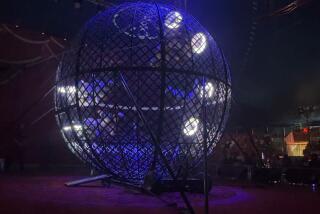Mothers Hate Them and Patrons Are Rude, but Carnies Love Jobs
Charles Betker doesn’t have a mortgage. He doesn’t pay utility bills or phone bills. He says he makes “about” $175 a week. He chain-smokes Marlboro cigarettes and twists the ends of his walrus-like mustache as the wheels of the Himalaya roll round and round.
When the ride reaches its wildest speed and the dozens of kids who paid their money are squealing and shouting at the top of their lungs, Betker says he thinks about his own kids and wishes he could see them. They’re someplace else. Where, he doesn’t say.
He just knows they’re not too much different from the kids who line up to ride the Himalaya, the high-speed Tilt-a-Whirl Betker operates at the Del Mar Fair, sometimes from 11 in the morning until 2 the next morning.
Hopes Both He and the Job Last
Betker, 46, is what’s known in the trade as a carny. He’s one of 1,100 itinerant workers representing the 35 companies that handle the midway’s rides and games, according to Ted Bear, a spokesman for the Del Mar Fair.
A former oil field worker and landscaper from Santa Maria, Betker is in his third year of being a carny, “a job I hope lasts as long as I do.”
With his desk a cluttered heap of cigarette butts, ballpoint pens, screwdrivers and pliers, Betker said he hadn’t had a break in about five hours.
“And now I’m about to scream,” he said, staring at the half-eaten bowl of chili in the trash can.
Don Blackwell, who runs one of the games--bust a balloon with a tiny dart and voila! You win a prize--says carnies most appreciate the company of other carnies because they know there’s mutual respect, which they don’t always get from the patrons.
He says carnies most resent the image and the word, feeling that they’re nothing like the lawless vagabonds that the term implies.
“The people who come to these fairs,” said Blackwell, 29, shaking his head, “they think we rape, plunder and steal. Mothers are fearful at the sight of us coming into town.”
He laughed uproariously.
“In the old days, the games were rigged,” he said. “Let’s face it, they were. Nowadays, you’ve got vice cops checking you out every step of the way. Everything has to be on the level.”
Blackwell, who calls his makeshift “home” Lodi in Northern California, stays camped at his postmark a mere two months out of every year. He’s on the road “in my carny trailer” from the first week in February until almost Thanksgiving. Like most of the carnies at the Del Mar Fair, which “thank God!” ends July 4, Blackwell said, he makes a circuit throughout California and Arizona. He ventures occasionally to Oregon and Washington. Del Mar’s hours are longer than many other fairs’, the carnies said.
“The hours are the roughest,” he said, “but it’s something you get used to. At a fair like this, you don’t get a bit of sleep and by the end you’re a wreck. You eat lots of junk food. You’d give anything for a home-cooked meal.
“But this is the only job I’ve ever enjoyed. I’ve been doing it since I was 14. I got in trouble with the law--I did somethin’ I had no business doin’ and paid for it--and found the only kind of work I could stomach when I got out was bein’ a carny. I just love bein’ with other carnies. Like I said, we respect each other.”
Just Plain Nastier
Blackwell said the paying customers aren’t as nice as they used to be, that folks in general are just nastier than they’ve ever been.
“People say carnies used to fight a lot, but most of the people fighting out here, are the customers, especially all these gang members you have here now. They been causin’ us trouble this year.”
Butch Crane, 28, has traveled the carny circuit for 12 years. On Thursday, he, too, had gangs on his mind.
“We’ve had trouble with that stuff this year, and the fights hurt,” he said. “They really hurt our business, because they scare people away. But I’ll take San Diego over L.A. any day. We just did the L.A. Sports Arena. What a zoo that was.”
Kim Jones, 35, who works the Enterprise ride like Wolfman Jack exhorting a late-night radio crowd, said carnival work is sometimes a madcap family affair. He and the other Joneses hail from Portland, Ore., and all labor on the Enterprise, one of Del Mar’s more frenetic, scream-inducing whirligigs. Jones calls himself a “fourth-generation carny.”
His great-grandfather got into the business in his native Indiana. Jones hopes his sons, ages 6 and 9, maintain the tradition.
Hours Are Killers
“It’s great work if you don’t dig the structure of corporate life,” he said. “The hours are pure killers, but you can be your own boss. It’s vicarious excitement, watching other people and taking in their pleasure, but it is fun. It makes you feel like a circus impresario, which feeds some kind of crazy show-business instinct I guess we all have.”
Betker at next door’s Himalaya said that safety is a constant concern, “the one thing that’s always on my mind.” He said carnies go out of their way to make sure the paying passengers are protected, while Crane said carnies worry about getting hurt themselves.
More to Read
Sign up for Essential California
The most important California stories and recommendations in your inbox every morning.
You may occasionally receive promotional content from the Los Angeles Times.









